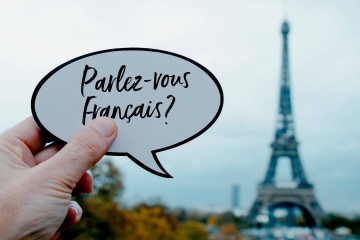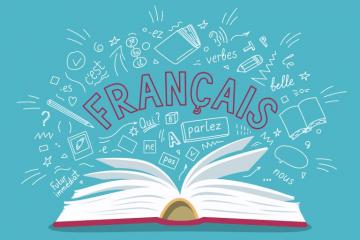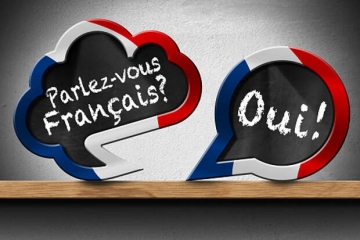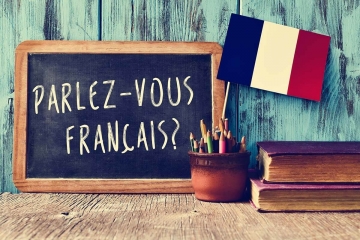
Argot is the language of the shadows. (Victor Hugo, *Les Misérables*)
Argot is a secret language. (Victor Hugo, *Les Misérables*)
Argot - an element of unofficial French speech
Argot has been studied by linguists for centuries. It is believed that originally, argot was used by prisoners in jails to prevent the guards from understanding them. For the same purpose, gangs also used it to remain incomprehensible when planning their crimes.
Over time, argot ceased to be the language of outcasts. It has now become an integral part of the French language, although it still maintains its original purpose – to keep certain words secret from outsiders' ears.
Here are some examples of argotisms in modern French:
la bouffe (food) instead of la nourriture (food)
la bagnole (car) instead of la voiture (car)
se casser (to leave) instead of quitter (to leave)
le boulot (work) instead of le travail (work)
le pote (buddy) instead of l'ami (friend)
la thune (money) instead of l'argent (money)
le mec (guy) instead of l'homme (man)
la nana (girl) instead of la femme (woman)
vachement (really) instead of très (very)
The History of Argot's Origin
As early as the 13th century, the word **jargon** was used, and two centuries later, in the 15th century, poet François Villon used the term jobelin to describe the slang of criminals. In 1596, a text titled *La Vie généreuse des Mercelots, Gueuz et Boesmiens* was published in Lyon by an unknown author who signed as Pechon de Ruby. The text focused on the jargon of small traders and beggars.
From that point on, the use of argotisms in literature gained traction, not just in France but elsewhere. One notable work that makes heavy use of argot vocabulary is known to a wider audience through the film "Vidocq", starring Gérard Depardieu. Eugène François Vidocq, a famous detective with a criminal past, left a rich literary heritage that is highly valuable for philologists studying argot. Even Alexandre Dumas used Parisian argot in his work "Les Mohicans de Paris".
Having firmly embedded itself in various social circles, French argot or, more simply, slang words and expressions have become such an integral part of modern French that they can even be heard in public speeches. Today, **argot** has moved beyond being the language of criminals and outcasts.
At the same time, the themes of argot have expanded. Whereas it once mainly dealt with topics like "money," "drugs," and "prostitution," it now also includes professional terminology.
For example: "marchand de soupe" (soup merchant) refers to a restaurant owner, "marchand de sommeil" (sleep merchant) refers to a hotel owner, "marchand de mort subite" (merchant of sudden death) refers to a low-skilled doctor.
Argot can also describe someone's appearance: "avoir les jambes en parenthèses" (to have legs like parentheses) means "to have bow legs", "ne plus avoir de fil sur la bobine" (to have no more thread on the reel) means "to be bald".
Other modern argot phrases might sound like: "avoir du retard à l’allumage" (to be slow to catch on). Instead of saying "tu es nul" (you are dumb), the expression "t’as rien dans le disque dur" (you have nothing on your hard drive) is used today.
Of course, slang is especially popular in youth culture. For example, students might refer to graduates as "ancêtres" (ancestors) or "vieux" (old folks), while directors might be called "kingkong". If a student isn't prepared for a lesson, they might say they are "pédaler dans le yaourt" (pedaling in the yogurt), meaning they're struggling or not getting anywhere.
French slang is rich and diverse
A special place is occupied by "Verlan"—French "reversed" slang, where syllables in words are swapped. The word itself comes from **l’envers** (meaning "the reverse"). For example, **fou** (crazy) becomes **ouf**, and **louche** (suspicious) becomes **chelou**. Verlan developed as a way of secret communication, especially in youth subcultures like hip-hop and gangs.
Example:
C’est un truc chelou. - That's a weird thing.
Other popular Verlan slang examples include:
| meuf | woman, from femme |
| beur, rebeu | arab, from arabe |
| tromé | subway, from métro |
| manéci | movie, from cinéma |
| turvoi | car, from voiture |
| céfran | French, from français |
| asmeuk | like this, from comme ça |
| teuf | party, from fête |
| féca | café, from café |
| zarbi | strange, from bizarre |
| zicmu | music, from musique |
| iom | me, from moi |
| cheug | left, from gauche |
| skeud | disc, from disque |
| reuch | expensive, from cher |
| renps | parents, from parents |
| Zyva | go ahead, from Vas-y! |
| zonpri | prison, from prison |
Franglais - the mix of English and French
In recent decades, French slang has incorporated a large number of anglicisms. This blend of English and French is known as Franglais. It is especially noticeable in youth and professional circles, where phrases like cool, parking, email, chat (chat, not cat!), and hashtag are common.
Examples:
J'ai checké ton message sur WhatsApp. — I checked your message on WhatsApp.
On va chiller ce soir? — Are we chilling tonight?
Franglais is often used in the internet, fashion, and technology worlds. It's very popular among the so-called **bobo** — bourgeois youth.
Another variation of French slang involves replacing a word's meaning with the opposite.
For example:
| mortel | cool (not "deadly") |
| méchant | great (not "mean") |
| c’est fatal | it's genius (not "deadly") |
| ça va faire mal | this will be awesome (not "this will hurt") |
| t’inquiète | don't worry, calm down (instead of "worry!") |
| t’occupe | it's none of your business (instead of "take care!") |
| Ouf | that's cool! (instead of "crazy") |
Interestingly, the word **ouf** is especially notable because it underwent two changes: first, it was reversed in Verlan from **fou** (crazy), and then its meaning flipped to "incredible" or "cool."
Example:
T'as vu ce film? Il est ouf! — Did you see this movie? It's awesome!
Top French Slang Phrases.
- Kiffer — to enjoy
If you like something or really love it, it’s quite normal in modern French slang to use "kiffer." This word comes from Arabic, but is now widely used in youth culture.
Example:
J’ai trop kiffé ce concert! – I totally enjoyed that concert! - C’est trop — it’s too much...
This expression indicates that someone is doing something excessively, often with a positive tone. For instance, if someone does something really well or looks great, you can say "T’es trop!"
Example:
T’es trop stylé avec cette veste! – You look so cool in that jacket! - Vachement — really, extremely
Instead of saying "très" (very), you can use "vachement." This word has become one of the most popular in youth speech.
Example:
C’est vachement cool ce film! – This movie is really cool! - Zarbi — weird, unusual
"Zarbi" is another very popular word expressing confusion or surprise.
Example:
Ce truc est trop zarbi. – This thing is so weird. - Sapé comme jamais — dressed to the nines
The phrase "sapé comme jamais" means that someone is dressed very stylishly. It comes from the fashion world, and if someone looks super cool, you can say they are "sapé comme jamais."
Example:
Regarde-le, il est sapé comme jamais! – Look at him, he’s dressed to the nines! - Flemme — laziness
When you don’t feel like doing anything, you can say "avoir la flemme." This expression is very popular among young people.
Example:
J'ai la flemme d’aller à la salle. – I don’t feel like going to the gym. - Nana — girl
"Nana" is a more informal and cute way to say girl.
Example:
C’est une nana sympa. – She’s a cool girl. - Pote — friend
If you want to say "friend," use "pote," which is a more casual synonym for the more formal "ami."
Example:
C’est mon pote, on traîne ensemble. – This is my friend, we hang out together. - Taffer — to work
"Taffer" is a colloquial word, coming from Arabic, that means "to work" and is widely used in youth slang.
Example:
Je dois taffer ce weekend. – I need to work this weekend. - Chaud — hot, tough
This word can describe not only temperature but also a difficult or intense situation.
Example:
Ce match est chaud! – This match is intense! - Glander — to slack off
If you don’t want to do anything, you can say you’re "glander" — slacking off.
Example:
Aujourd’hui, je vais glander toute la journée. – Today, I’m going to slack off all day. - Pécho — to hook up, to meet
This word is mainly used when someone has attracted someone or started dating someone.
Example:
Il a pécho une meuf hier soir. – He hooked up with a girl last night. - Blé — money
This word is used to refer to money, especially in informal conversations. It’s sometimes used in the phrase "avoir du blé" (to have money).
Example:
Il a plein de blé, il roule en Porsche. – He has a lot of money, he drives a Porsche. - Délire — fun, craziness
This word is used when something is very fun or absurd.
Example:
Cette soirée était un délire! – This party was insane!
In conclusion, slang typically reflects certain groups or segments of society, so it should be used with caution, especially in formal situations, such as job interviews. This article highlights the most common and neutral expressions that frequently appear in popular songs and daily conversations among French speakers.
If you're interested in learning more about slang and speaking modern French fluently, start the "Conversational French" course with Skype-Language.com. Our teachers will share their knowledge of current French trends and teach you what you won’t find in traditional textbooks.
P.S. We recommend the online slang dictionary Bob: Dictionnaire d'Argot. Also, the profile of the French Instagram blogger Antonin, where you will find many sketches on the topic of slang.






























